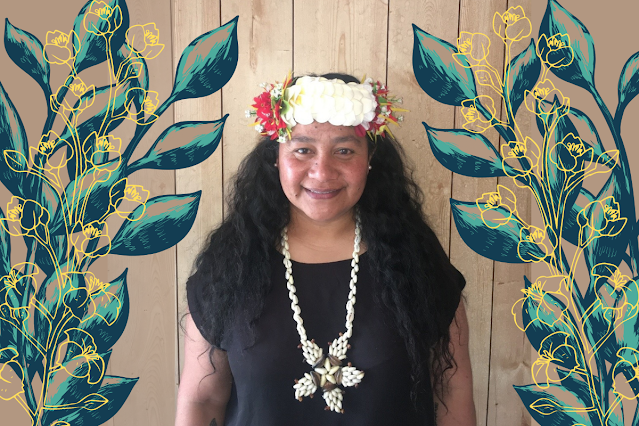Spotlight on: Meli Kaveinga
Meli is a member of the Tuvalu community who lives in Rānui and frequently visits our libraries.
Talanoa with Meli
Fakatalofa atu! Tell us a little about yourself, Meli!
Talofa, my name is Meli Kaveinga.
I was born in Funafuti the capital of Tuvalu. I was raised by my grandparents Melita and Semese Alefaio. We moved here to New Zealand when I was very young and have been here ever since.
I've been teaching for more than ten years at different schools and I'm currently at Birdwood School in Rānui as the Learning Support Coordinator.
What does Vaiaso o te Gana Tuvalu -Tuvalu Language Week mean to you?
Tuvalu Language Week means a lot to me because this is a special time of the year where I can showcase my culture and language.
It’s also a great opportunity for me to teach others about my language and culture and to also allow people from other cultures to learn a bit more about my culture. It’s also a time to connect with others in the Tuvalu community as well as the wide community.
I really enjoy Tuvalu Language Week because I get to celebrate our unique culture and language along with others. It’s always full of fun and laughter which in a way represents who we are.
How do you celebrate it or acknowledge it in the workplace and at home?
I celebrate Tuvalu Language Week at school by teaching Tuvaluan dancing and songs as well as other learning activities and experiences around the curriculum.
I work alongside our Tuvaluan families and we provide meakai (food) for everyone so they get a taste of some Tuvaluan food.
We have a whole school assembly and the children get to perform their Tuvaluan dances they’ve been practising at school. The children also do daily notices in Tuvaluan where they share phrases, lotu and activities happening each day to celebrate the Tuvalu Language Week.
At home we also do something similar where we dance, sing songs and share Tuvaluan food.
With the community, we attend our Independence Day celebration and we participate in different activities happening throughout the week at different venues. Towards the end of the week we come together to do our traditional dancing – fatele and to finish off the week with a lotu and aogapese (groups singing hymns and songs together).
If there was one element of Tuvalu heritage that you love to see in Libraries and Auckland Council, what would it be?
I would really like my nana’s “Fafetu” displayed at the council because it represents Tuvalu. Her name is Melita Semese Alefaio. It’s one of a kind necklace and it’s only made in Tuvalu.
Although Tuvaluans know what the “Fafetu” necklace is, they do not know that there is a meaning to it.
We call it the “Fafetu” (star). A lot of Tuvalu women now know how to make the “Fafetu”. They make it and sell it so they can have money to take care of their families.
It’s also a special gift we give to visitors and special guests. We can use it to decorate our homes and special places. In Funafuti, which is the capital of Tuvalu, we use the “Fafetu” to decorate our meeting house – ‘maneapa’.
The “Fafetu” has done great in representing our Tuvaluan community in the world. It has travelled from the small island of Tuvalu to different parts of the world!
Fakefetai lasi Meli!
------
Auckland Libraries have wonderful Pasifika community librarians, collections specialists and leadership with diverse interests based in libraries throughout Tāmaki Makaurau.
Click here to find out more about how we can support you and your community.

Comments
Post a Comment